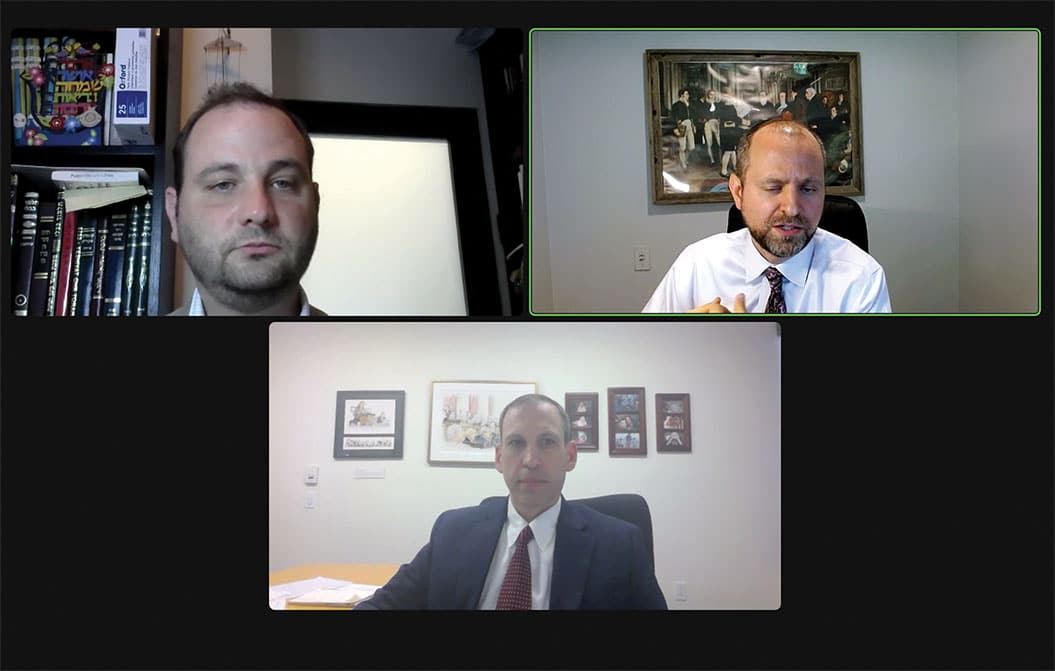 Screenshot from webinar
Screenshot from webinar Teach CA, a member of the Teach Coalition, held a webinar on July 5 providing an update on an ongoing lawsuit alleging that the California state government is unconstitutionally barring Jewish day schools from receiving federal funding for special needs services.
Mark Rienzi, president of The Becket Fund for Religious Liberty, which is providing legal representation to two Los Angeles Jewish day schools and three Los Angeles Orthodox Jewish families in the lawsuit, started the webinar by explaining that under the federal Individuals with Disabilities Education Act (IDEA), public schools are required to provide funding for special needs students. But some public schools don’t have the infrastructure for that, in which case they make a referral to private schools that do. The California state government has barred public schools from making such referrals to religious schools. “Simply by virtue of being religious, Jewish schools are excluded from participating and Jewish parents of children with disabilities are forced to either put their kid in public school and forgo putting them in a Jewish school … or they need to pay their own freight for the often expensive task that is supposed to be picked up by the government,” Rienzi said.
A hearing will be held on July 21 in which the state government will try to dismiss the lawsuit and the plaintiffs will request a preliminary injunction against the state law. “What we’re hoping to do is trying to drive home the point … that the government can no longer discriminate against religious schools in this way,” Rienzi said.
Avi Helfand, a professor at Pepperdine University and senior legal adviser for Teach Coalition, further explained that in the short term, “tons and tons of Orthodox Jewish students” would benefit from being able to obtain the money need to attend religious schools that can adequately provide special needs services. “We’re talking here like millions of dollars,” he said. “There’s a lot of money here that would go to building infrastructure in California, in Los Angeles … for special needs children.” As a result of the state law, many special needs families leave California altogether, Helfand added.
The bigger picture regarding the lawsuit is that California state constitution actually bars funding to private schools. But Helfand argued that the constitutional provision “doesn’t seem to be as broad or as expansive as you think,” pointing out that under IDEA, the state currently sends tuition dollars and funds for ancillary services to private schools when the school districts are not able to provide those services themselves. “What that means is they implicitly recognize that their rule that says, ‘No money to private schools’ doesn’t really mean no money to private schools,” Helfand said, as the state is providing “money to the child who then uses it for the school.” Consequently, the longer-term implications of this lawsuit is that the state could use this mechanism as a means to provide more funding to private and religious schools, Helfand argued.
Rienzi then lambasted 50 years of precedent in the legal system keeping federal tax dollars away from religious institutions, a notion that many government institutions have internalized. “That’s what California’s rule here is based on,” Rienzi said. “They’ve got this built-in thing, they think, ‘Let’s just keep the religious schools out.’ That’s the wrong interpretation of the Constitution. The Supreme Court has rejected it, but a lot of states––including California––are very slow to get the message. And so one benefit of this lawsuit, honestly, is it just brings it right to center stage, right away.” He added that the state doesn’t provide a compelling interest as to why the funding shouldn’t go to religious schools. “Are we gonna suddenly be establishing Judaism in California if we help these special needs kids at these schools? Obviously not,” Rienzi said.
Rienzi later said that the judge hearing the case has ruled against religious liberty cases in the past, but has been subsequently overruled by higher courts. “The courts in California are not super friendly on religious liberty right now, even though the Supreme Court has been great,” he said, adding that the Ninth Circuit has been better on this issue. Rienzi believes it will probably take “several years” for the litigation to be completed but is confident that the plaintiffs have a “strong” legal argument that is backed by recent Supreme Court precedent.
A rally in support of the plaintiffs will be held on July 21 at 8:30 a.m. at Gloria Molina Grand Park on the lawn across from Los Angeles City Hall.























 More news and opinions than at a Shabbat dinner, right in your inbox.
More news and opinions than at a Shabbat dinner, right in your inbox.